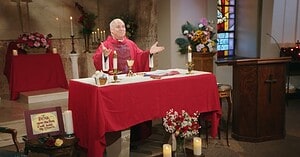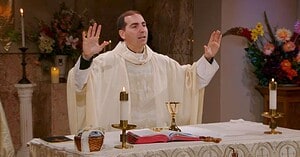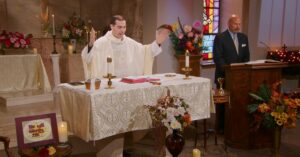Easter Sunday of the Resurrection of the Lord
Homily Video
Easter Sunday of the Resurrection of the Lord Homily Transcript
Well, springtime is all around us. It’s the lengthening of the days, where the sun seems to now grow stronger each and every day. And so it’s very easy, as we look at nature and the springing of blossoms on trees, that spring green of those leaves that come out, that there’s new life all around us. And that happy coincidence of nature and this feast day of Easter is something that we need to keep in mind as we go about our daily lives, where we see that all of creation seems to be caught up in the new life that comes in Christ.
But there’s something very interesting about this Easter day as it lists from the readings in the Gospel that we have. I’ve always thought it a bit strange that here on Easter day we have no Gospel text that includes an actual spotting of Jesus. Later on in the season we’ll get that. But here on Easter, the day in which we celebrate he rose from the dead, he doesn’t show up. It’s quite extraordinary. Now I don’t know about you, but I would have had an altogether different approach to Easter, if I were Jesus.
I would have shown up at Pilot’s porch or Herod’s house and made it the biggest, “I told you so,” in the history of humanity. Jesus didn’t do that. We don’t see that happening on Easter day. Instead, what we’re left with are these disciples, and the faith that they have. That is what is shared with us on Easter day, not the sighting of Jesus in a way that we can observe him with our eyes, but rather we witness the faith of these disciples. A faith that so transformed their lives that it became contagious, to the point where others came to believe.
There are three things to notice about what happens to Mary Magdalene, Peter and John, the beloved disciple. Notice first of all, that Magdalene goes early in the morning while it’s still dark. There’s something gnawing in her that wanted her to go to the tomb. Yes, maybe she wanted to pray there, to anoint the body as we hear in the Scriptures. But there’s something else that drew her there that day, that particular day. And it was, in fact, that God’s grace was secretly working in her life. So often, we kinda go about our day, we have experiences one right after another as though they’re unrelated events. But every so often, we recognize that something else is happening in our lives, that God is calling us to something more.
And sometimes, we also overlook that happening in other people. I’ve often thought that we adults underestimate the grace of God working in the lives of children. They have a very vibrant spiritual life. But so do people sometimes that we discount, maybe because of their infirmity or because of their age. A bishop told me once, said, during Lent he decided that he was going to visit nursing homes during the season of Lent. He felt that he had neglected those people who were elderly.
And so, one day he came across this rather elderly woman. He said she looked like she was in her 90’s. She was fast asleep in a wheelchair in the hallway. But she had across her lap a completed New York Times crossword puzzle in ink. And so he taps her on the shoulder and he says, “Hello, dear. Do you know who I am?” And she held up her head, she woke up, and she looked at him and said, “No, but if you go up to the front desk, somebody can tell you.” Sometimes we feel as though nothing’s happening in peoples’ lives, maybe because they’re tired or they’re elderly, they’re infirmed.
But we hear today that God’s secret graces comes into each one of our lives. And today is a day to pay attention to that, but also never to write anybody else off, to judge them to the point where we say they can’t change. And so the faith that we’re called into this day is first of all, that faith that God’s grace is working in hidden ways in our lives and the lives of other people. The second thing that we see is that there’s a lot of activity in this Gospel. Everybody’s running around.
Mary Magdalene goes in the tomb, sees it’s empty, runs to Peter. Peter and John run over to the grave, to the tomb, and in fact, one outruns the other, gets in there. And there’s a lot of commotion. There’s a lot of activity. It shows that faith has an energy to it that changes our life to the point where it is a single focus and there is a grace in our lives that begins to see that there are other factors in our life just beyond all those things that preoccupy our attention.
Our faith does have that kind of impact, where it energizes us to become involved, maybe in the church or in a charitable work. A way in which we make sure that we put into practice the Gospel, knowing that the Lord is calling us to have that kind of energy. The Eucharist is an opportunity for us, whenever we come together, to reconnect with that energy, that sense in which our lives are transformed by what happens. And whenever we go to realize that the dismissal into the world is about being sent to make a difference.
The third thing that we see is that there is a kind of stunned disbelief, what’s happening, but an equal share of a desire to tell other people about it. Mary Magdalene’s first impulse was not to go back to her house and just think about this and maybe figure it out, or maybe go to the soldiers and find out where they took the body and to investigate it. She didn’t do any of that. Her first impulse was to go and tell others, somebody else, go and tell other disciples. And she told the story of the empty tomb in a way in which she witnessed it herself. That’s so very important for each one of us.
Our faith has to have that dimension where we not just pass on the faith in terms of doctrines to our children, but we sit down with them and tell them why is it that we believe. That’s a great gift that grandparents can give grandchildren, to sit down someday with them and tell them why you remain strong in the faith, of how your faith has made a difference in moments in your life that otherwise you could have come crashing down. How it helped you from going over the edge in which God’s grace was there to pull you back, or whenever you found a difficult time in your life that you struggled with and God’s secret grace came.
It is that kind of faith that’s shared, not just in terms of doctrines and tenants of faith, but of life experiences. And so today, we don’t see Jesus risen from the dead, but we do see these people. Their witness of faith in such a way that their lives were changed, and they ended up changing the course of history. In the end, the real message of Easter is not just that Jesus came out of the tomb, that he rose from the dead, but that his disciples also rose. There was new life in them, and that is the challenge for each one of us, to have that kind of faith, to go forth this day and know that we are those Easter people.
We are Christ in the world, as those whose lives have risen from the dead, the dead of sin. But also, risen in a way that can change the world.
Readings
First Reading:
Acts 10:34a, 37-43
Second Reading:
Colossians 3:1-4
Gospel:
John 20:1-9 (42)
Featured Text
A special thank you this week to our friends of Mercy Home for Boys & Girls in the congregation.
Discover More
Saints Peter and Paul, Apostles
June 29, 2025
The Most Holy Body and Blood of Christ
June 22, 2025
The Most Holy Trinity
June 15, 2025
Request Sunday Mass Guide
The Sunday Mass Guide sent to your home address
Spiritual nourishment and updates from the Sunday Mass community
Monthly reflections from Fr. Scott Donahue, our Principal Celebrant


